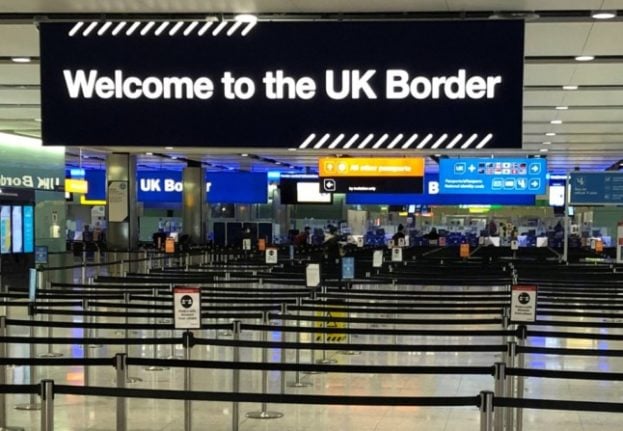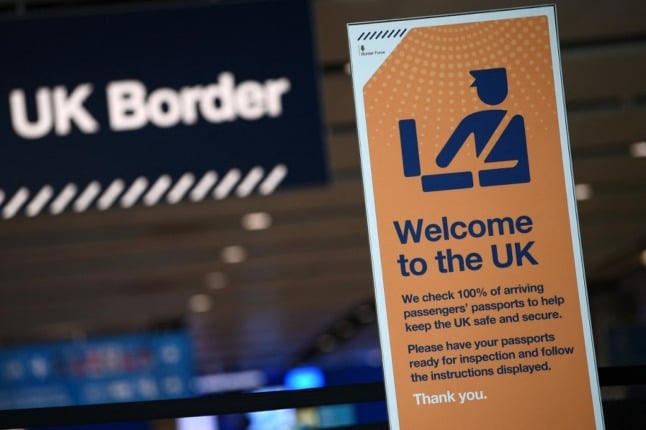For some it’s the reason they moved abroad in the first place, while others simply met a handsome local in their new home and fell in love.
Either way, of the estimated 1.2 million Brits who live in EU countries, a significant number have met and settled down with partners from the country where they live or another non-British nationality.
While most Brits living abroad have managed to secure their residency rights since Brexit, they could face a whole different set of problems if they ever want to return to the UK and take their spouse or partner with them.
Under rules agreed as part of the Brexit negotiations, Brits can move back to the UK without their European partners needing costly visas as long as they do so before March 29th next year.
But despite assurances given by the British government, the citizens’ rights campaign group British in Europe is warning that it is already seeing problems with the system, despite the deadline still being six months away.
When I stepped onto the ferry at Dover in September 1995 with my new German husband to move to Luxembourg I thought I was exercising my EU free movement rights. Little did I know I was sending myself into exile because I had fallen in love with a non-Brit #BrokenUKPromises https://t.co/3HOvzNMiGu
— Fiona Godfrey 🇪🇺 🇱🇺 🇬🇧 (@fjgodfrey) August 23, 2021
The system
Since the end of the Brexit transition period, EU nationals who want to move to the UK face a tough immigration process which has strict requirements including a minimum level of English and financial requirements.
Simply being married or in a civil partnership with a UK national does not remove these obligations.
What is in place, however, is an extended grace period in which UK nationals who moved abroad before Brexit can return to their home country and bring their EU spouse with them, as long as they do it before March 2022.
The problems
This system was not ideal and has left people facing tough choices. Even returning for a relatively short period, for example to care for an elderly parent back in the UK, can leave people facing a choice between their partner and their family.
Others may have no immediate plans to return to the UK, but may have considered it as a long-term option – now they have to either move back before March 2022 or face the prospect that moving back in future might not be impossible.
However now British in Europe is warning that even the system set up to process applications during the post-Brexit grace period is not working as it should.
EU nationals moving to the UK as the spouse of a British person have until March 29th 2022 to apply for Settled Status.
However, before they can apply they need to obtain a new EU family permit from the Home Office in the UK.
And British in Europe is warning that the Home Office is turning down some of these applications, often on seemingly flimsy or technical grounds.
Olivia, 7-mths pregnant, needs to return to support her ill father, but her husband’s visa has been refused. Does she stay with her OH or return to be with her father? The stress placed on the whole family is harming the health of all of them.
— British in Europe (@BritishInEurope) August 23, 2021
Appealing against this can be a lengthy process, leaving some people who have already applied worried about missing the March deadline.
Other families are living in limbo as processing of visas is taking months when they were told it would take weeks. They are worried about missing deadlines e.g. for schools, unable to find interim jobs and money is running out while they wait.
— British in Europe (@BritishInEurope) August 23, 2021
British in Europe’s Co-Chair Jane Golding said: “We are worried that there are many families across the EU who do not understand the implications of stringent immigration rules now applying to UK citizens in the EU.
“Many of us have older relatives in the UK who may need our care, or we had always planned to retire to the UK to be near family.
“The grace period given until the end of March 2022 is simply not long enough for families to make decisions to uproot and then arrange to return to the UK. We continue to lobby for a longer grace period.
“Families considering a move now need to be aware that the process is time-consuming and complex and that non-UK family members will first need to apply for a EU Settled Status family permit from outside the UK before the end of March 2022, and only when they have that and move to the UK will they be able to apply for EU pre-settled status.”



 Please whitelist us to continue reading.
Please whitelist us to continue reading.
Completely inhumane. Yet another example of the benefits from Brexit.
These rules always applied to spouses from third countries when UK was in the EU. Now the EU is just 27 third countries as far as UK immigration is concerned. They are a lot more lenient when it comes to ham sandwiches though.
I assume this eternal Brexit cruelty also extends to future relationships between single UK citizens living in Europe that don’t even exist yet? So, I now have to be careful about the nationality of any new partner I might wish to meet, fall in love with and marry?
This is appalling, given the unfettered illegal immigration happing in the UK at the moment.
The UK is happy to accept future terrorists in rubber dinghies, but reject perfectly decent and respectable people just because they happen to be born outside the UK. Yet another example, if one were needed, of the irrational, clueless policy making by Johnson’s so called government.
Migrants fleeing war and persecution and then legally gaining asylum are not “future terrorists in rubber dinghies”. I would rather have 100 of them in my neighbourhood than 1 racist, ignorant troll such as yourself.
Thank for your comment. I find those with no rational argument always resort to abuse, as you have so eloquently proved.
However, if you are so passionate about the legitimacy of the channel migrants, genuinely fleeing war and persecution, can you please explain to me:
1. Why they do not settle in the first country that they reach?
2. Why, according to Home Office figures, 98% of all channel migrants are male aged between 14 and 40. Where are the woman and children? For some reason they are obviously less eager to flee than their male compatriots. Please explain why that might be.
1. Bless you Tony, if you think that was abuse
2. You literally said refugees were future terrorists – that is both racist and ignorant (as well as a good few other ‘abusive’ terms that spring to mind)
3. There are so many painfully obvious reasons which are a quick Google away that I am not going to waste my time going into them here. But something tells me you aren’t interested in knowing or understanding, but rather looking to spew hate on a completely unrelated and innocent article, so I don’t see any point in continuing this conversation.
I note your lack of response to my questions.
As for spewing hate……where is your nearest mirror?
Agree, equating refugees with terrorists is disingenuous at best and at worst feeds into the leftist narrative that all right wingers (now a slur) are white supremacists.
Great article, thanks! But think this should read ‘now’ rather than ‘not’: now they have to either move back before March 2022 or face the prospect that moving back in future might not be impossible.
Agreed with the above comment. We can not classify all migrants as potential terrorists. But, my main concern is that uncontrolled immigration can and will likely lead to the rise of right wing fascist groups in those countries that allow this. One only has to look at the USA and Donald Trump to see where this can go in a country once considered to be the beacon of democracy and I think many of us can agree that it’s not pretty.
I have a friend in this very situation, the family has moved back to the UK while his Dutch wife is staying with friends. He was told 8-12 weeks (I think) but it’s looking closer to 8-12 months assuming she isn’t rejected.
As I understand it, the deadline set for end of March 2022 only applies to those partners who were already in a relationship on Brexit day. So tough luck to those who find new partners.
Gentlemen, let’s please have a civilized discussion here. I have never imagined that this is a place to verbally abuse anyone or call to task anyone’s personal opinions. We are all very opinionated people, that is clear. But one thing that is increasingly happening in the world is that we are expressing these opinions without regard to anything other than our own personal needs. Social media has allowed this abnormal process to live and thrive. There are other venues to use to express oneself in a critical way. This, however, is not a place for malice towards anyone. Thank you.